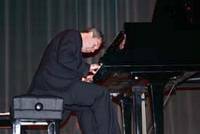
Ionel Petroi (France). Petroi’s compositions offer, with a kind of playful exuberance, a mix of pieces for soloists, chamber orchestra and symphonic orchestra, as well as computer-controlled electro-acoustic devices – sometimes accompanied by an instrumental ensemble – and even synopses from ballet or theater. Each work is singular – because of the diverse nomenclatures the composer calls upon – and yet they are linked together by their aesthetics, which he particularizes with the phrase “musique relative”. Through the use of the adjective “relative”, Petroi focuses the listener’s attention on the “out of step” effect deflecting the musical language from a reference zone – that of classical tonal functions – to an inflexion zone, a gliding towards the exoticism of uncertainty. The sapping microtonalism destabilizes – to the point of collapse sometimes – the stratification found in a tonal harmony suddenly contaminated by a deleterious flavor, which rarely leaves the listener unscathed.
Les mélodies de Sancho Pança
Despite their title, which echoes Maurice Ravel’s famous songs (Don Quichotte à Dulcinée), these melodies for baritone and string quintet are written in a style that clearly distances itself from any Hispanic influence. Rather, one denotes the presence of jazz in the rhythmic and melodic modulations, as evidenced by the use of some of its most recognizable onomatopoeias. Sarcastic juxtapositions (Grotesque et sentimental, Dans le style de Bach, Quasi Rock), absurd permutations (« Elle aimait les garçons, les glaçons des cafés, elle buvait les poissons, les garçons des marées… »), the musical discourse’s affected banality, all offer pretexts to forge “fakes”, the perverted relationship nevertheless shining through under the superficial touch fading beneath the microintervals.
Daniel Fournier


